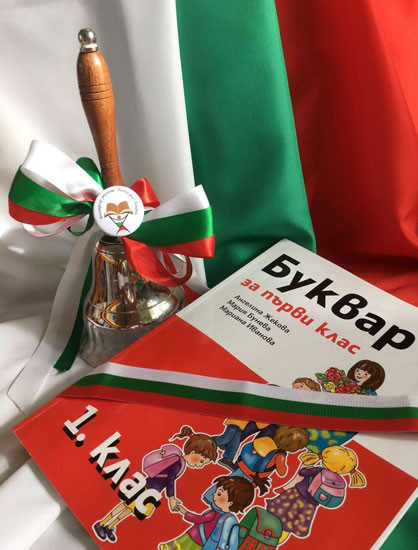Bulgarian Sunday schools abroad are a true phenomenon of the modern Bulgarian educational system. They remind us to the highest degree of those National Revival period leaders from the time before Bulgaria’s Liberation, who dedicated their entire lives to preserving the Bulgarian language, folklore and culture and to bequeathing them as an enduring value to the generations to come. Today, hundreds of Bulgarian families around the world are fond of their mother tongue and, although in a foreign environment, they manage to pass it on to their children.
 Sunday schools play the role of a living connection with the Motherland. They are created by organizations of Bulgarians registered in foreign countries. There are also those which were established as part of embassies and consulates of the Bulgarian state, as well as of Bulgarian Orthodox communities around the world. The first Bulgarian schools abroad were established by Bulgarian gardeners in Prague, Bratislava and Budapest after 1945. In the last 10 years the Bulgarian communities abroad have been very active in the organization of educational schools, courses in Bulgarian traditional dance, music, singing. Bulgarian schools abroad are purposefully supported through programs of the Ministry of Education and Science. Their number has now reached 335, in 50 countries worldwide. These schools are centers of the Bulgarian spirit because they not only take care of preserving the Bulgarian self-awareness, the Bulgarian language and culture among young Bulgarians, but also of promoting the Bulgarian language in the communities where they are located, says Natalia Mihalevska, Director of the Education of Bulgarians Abroad and the School Network Directorate at the Ministry of Education.
Sunday schools play the role of a living connection with the Motherland. They are created by organizations of Bulgarians registered in foreign countries. There are also those which were established as part of embassies and consulates of the Bulgarian state, as well as of Bulgarian Orthodox communities around the world. The first Bulgarian schools abroad were established by Bulgarian gardeners in Prague, Bratislava and Budapest after 1945. In the last 10 years the Bulgarian communities abroad have been very active in the organization of educational schools, courses in Bulgarian traditional dance, music, singing. Bulgarian schools abroad are purposefully supported through programs of the Ministry of Education and Science. Their number has now reached 335, in 50 countries worldwide. These schools are centers of the Bulgarian spirit because they not only take care of preserving the Bulgarian self-awareness, the Bulgarian language and culture among young Bulgarians, but also of promoting the Bulgarian language in the communities where they are located, says Natalia Mihalevska, Director of the Education of Bulgarians Abroad and the School Network Directorate at the Ministry of Education.
“The teachers at the Bulgarian Sunday schools are not simply teachers, but patriotic persons who have other professions, but in their spare time they go back to their Bulgarian roots, teaching Bulgarian children abroad. They do not just go into a classroom to bring the children together, moreover given that education there is not compulsory. These are people who have succeeded in motivating parents to bring their children and travel aa long distance to attend a Bulgarian school. The training is on weekends, which means that they devote their limited free time to school so that their children can learn Bulgarian. The teachers in these schools motivate the parents, inspire the children themselves, and show ingenuity by offering innovative methods borrowed from the local education system in combination with Bulgarian educational traditions.”
By changing its rules, the Bulgarian Education Ministry aims to attract young people of Bulgarian origin living abroad to choose Bulgarian education in the future. A step in this direction is made with the opportunity which is given to everyone who has acquired a certificate of good command of Bulgarian language (B2), to apply to the higher educational schools of Bulgaria, without a matriculation exam held in Bulgarian.
The ministry takes great care not only in financing the classes of teachers in Bulgarian language, history and geography of Bulgaria, but also the teachers in extracurricular activities related to the national folklore and culture in schools around the world, adds Natalia Mihalevska:
“We have created such curricula that the knowledge of the Bulgarian language can be certified. In this way, students will not only show that they know their mother tongue at a certain level, but they will also be able to find work with this document further into their lives. Our concern is for more than 40 thousand Bulgarian pupils from the 1stto the 12th grade to be able to study not only on-site at Bulgarian schools, but also electronically and remotely where they cannot attend a Bulgarian school.”
English Rossitsa PetcovaPhotos: @bsrodnarech
For the 51st time, the Ikar Performing Arts Awards will be presented at an official ceremony at the Ivan Vazov National Theatre in Sofia on 27 March - World Theatre Day. The theme of IKAR 2025 is 'PARTY Coalition' - a reflection of the political..
The oldest opera theatre in Bulgaria outside the capital Sofia - the Stara Zagora Opera , which is celebrating a remarkable centennial anniversary this creative season, presents a new production of Verdi's masterpiece Rigoletto on March 28 and 29...
“Standing on stage in front of so many people, with everyone looking at you and listening to the Bulgarian anthem is just a bomb of emotions,” says Dalia Rogova, who is Bulgaria’s new hope for a gold medal at the Dance World Cup, which this year will..

+359 2 9336 661
